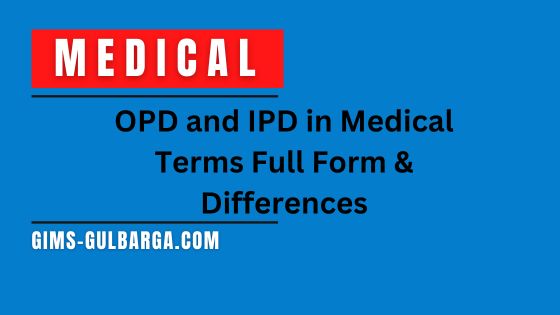In healthcare and medical treatment, two terms frequently come up: OPD and IPD. While they might sound technical, understanding them is crucial for anyone seeking medical attention or considering health insurance policies. In this article, we will see what exactly are they and understand their differences.

What are OPD and IPD?
- OPD (Out-Patient Department): OPD stands for Out-Patient Department. This is where patients receive treatment without getting admitted in the hospital. Consultations, dental procedures, minor surgeries, and ophthalmic procedures fall under OPD care. Patients visit the OPD for consultations and can return home the same day without an overnight stay.
- IPD (In-Patient Department): IPD stands for In-Patient Department. This is where patients are admitted in the hospital for treatment that requires an overnight stay. The duration is typically more than 24 hours. IPD treatments are more intensive and can include major surgeries, childbirth, severe illnesses requiring constant monitoring, and rehabilitation services.
Why the Difference Matters?
The difference between OPD and IPD is not just in the definitions. There are practical implications:
- Cost: IPD treatments are generally more expensive than OPD ones. This is because IPD treatments often involve more intensive care, uses the hospital facilities, and longer durations.
- Frequency: Patients might visit the OPD more frequently for regular check-ups and minor treatments. In contrast, IPD visits are less frequent but are more intensive.
- Health Insurance: Many health insurance policies differentiate between OPD and IPD coverage. While IPD treatments are commonly covered, OPD coverage might be optional or come as an add-on.
Health Insurance and OPD/IPD Coverage
Health insurance plays a big role in healthcare. With rising medical costs, having the right insurance policy can be a lifesaver. Here’s how insurance interacts with OPD and IPD:
- OPD Coverage: Some health insurance providers, like Apollo Munich, ICICI Lombard, and Bajaj Allianz, offer OPD coverage as an added benefit. This can include doctor consultations, pharmacy bills, diagnostic tests, and more expenses.
- IPD Coverage: This is a standard feature in most health insurance policies. It covers expenses like room rent, ICU charges, doctor consultations, surgeries, and more.
Claim for OPD & IPD
When it comes to settling claims for OPD and IPD treatments, there are two methods:
- Cashless Claims: Patients can get treatments without paying upfront at network hospitals. By presenting an e-health card, the hospital processes the claim directly with the insurance provider.
- Reimbursement Claims: Patients pay for the treatment first and then claim a reimbursement from the insurance provider. This involves submitting all relevant bills and documents.
FAQs on OPD and IPD
What does OPD stand for?
Answer: OPD stands for Out-Patient Department. It refers to medical services where the patient does not need to be admitted to the hospital.
What is IPD in medical terms?
Answer: IPD stands for In-Patient Department. It refers to medical services where the patient is admitted to the hospital for more than 24 hours.
Why are IPD treatments generally more expensive than OPD?
Answer: IPD treatments involve more intensive care, use of hospital facilities, and longer durations, making them generally more costly than OPD services.
Can I claim insurance for both OPD and IPD treatments?
Answer: Yes, many insurance policies offer coverage for both OPD and IPD treatments. However, the specifics depend on the terms of your policy.
Are there treatments that insurance won’t cover, either under OPD or IPD?
Answer: Yes, every insurance policy has certain exclusions. You must read your policy terms to understand which treatments or services aren’t covered.